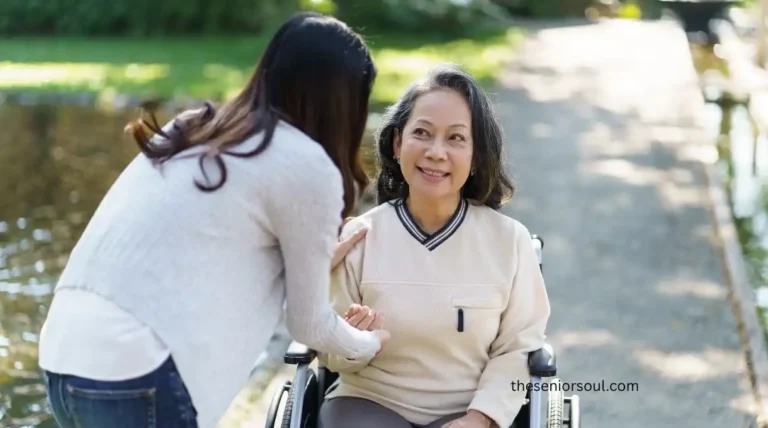Bedtime journal prompts for seniors to transform nighttime routines

Have you recently experienced insomnia or racing thoughts before bed? It’s normal to have trouble getting to sleep or staying asleep as we become older. This problem can have a serious effect on our health. A National Institute on Aging study found that about half of persons over 60 experience sleep disturbances on a regular basis. Lack of sleep increases the risk of chronic illnesses like heart disease, irritation, and memory issues.
It gets worse when you can’t sleep night after night and feel annoyed. You lie awake with muddled memories and racing thoughts, which adds to your tension. However, I found a comforting remedy, bedtime journal prompts for seniors.
Table of Contents
Why Bedtime Journal Prompts for Seniors are helpful
Using journaling prompts before bedtime improves your evening routine. They assist the mind rest by organizing your thoughts. Writing before bed improves the quality of sleep and lowers anxiety, according to a 2018 study published in the Journal of Experimental Psychology. This is something I have personally experienced. I felt calmer and had much better sleep after I started journaling every night.
Bedtime Journal Prompts for Seniors
Prompt 1. Gratitude Reflection
Expressing thankfulness at the beginning of your notebook helps you relax. Think about the things you valued most today. For instance, “Today, I am grateful for talking to my grandchildren.” The simple act increases your mood and makes it easier for you to fall asleep.
Prompt 2. Today’s Wins
Confidence is increased by concentrating on your achievements, no matter how small. Write about a small success, such as finishing your regular walk or preparing a nutritious dinner. Acknowledging your accomplishments inspires you and eases anxious thinking.
Prompt 3. Peaceful Memory
Anxiety can be reduced by revisiting peaceful memories. Write about a time in the past when you were genuinely at peace. Maybe your peaceful morning coffee or the soft air at a family picnic last summer. Calming brain chemicals are released when you think back on quiet memories, which helps you sleep better.
Prompt 4. Tomorrow’s Focus
Make a list of your top priorities to help you forget about tomorrow. Clarity is achieved by outlining a basic plan for tomorrow. For instance, “Tomorrow, my priority is to set up my medication schedule.” These ideas won’t take over your head right away after you put them in writing.
Using Journal Prompts for Seniors Effectively
Use brief, straightforward sentences when journaling. Be precise and clear. Steer clear of ambiguous entries. Rather than stating, “Today was good,” use, “Today, I felt happy seeing my friend at the park.”
Creating a Journaling Routine
Consistency greatly improves the quality of sleep. Every night, spend ten minutes to journaling. As a visual reminder, keep your journal next to your bed. Journaling becomes into a safe habit after a week.
Proven Benefits of Journaling for Seniors
The American Psychological Association’s research backs up the benefits of journaling, including improved memory, decreased stress, and anxiety. Regular journaling by seniors makes them feel less alone and more fulfilled. In my experience, journaling turned into a peaceful evening companion that allowed me to calmly reflect on my day.
Common Concerns Addressed
Many elderly people are concerned about “doing it right.” Keep in mind that there is no one ideal approach to journal. Your journal is private. Write openly and truthfully. Privacy is another major concern. If you would want, keep your journal safe. Your comfort and peace of mind are the main goals.
Additional Prompt Ideas
- Write down your favorite quote and reflect on why it inspires you.
- Describe a goal you’re excited to achieve.
- List five small joys from today.
Examples of Effective Journal prompts for Seniors
Here’s an example of how simple journaling can look:
“Today, I enjoyed sitting outside in the sunshine. I felt peaceful hearing birds chirping. Tomorrow, I want to call my sister and organize my bookshelf. I’m grateful for good health and supportive friends.”

Incorporating Journaling into Your Daily Life
Start with simple, realistic prompts. Modify your prompts as needed. Change the prompt to something simpler if it sounds stressful. The simpler, the better. Sleep and emotional clarity improve by consistent practice rather than perfection.
Why Seniors Need Special Journaling Prompts
There are particular mental and emotional difficulties associated with aging. Simple, tailored instructions benefit seniors in overcoming these challenges. They include topics unique to older people, such as improving memory, lowering feelings of loneliness, and coping with loss.
Bedtime Journal Prompts for Seniors
Seniors who struggle with anxiety, memory, and sleep can find a simple remedy by keeping a notebook before bed. It is supported by both firsthand knowledge and scientific research. Begin this evening. Don’t complicate things. To relax, practice thankfulness, introspection, and well-thought-out planning.
Observe the change when you add journal prompts for bedtime into your evening routine. Every day, you wake up more clearly, feel calmer, and get better sleep.
RELATED POSTS
Healthy Snacks for Seniors: What to Eat for Better Digestion and Energy?
Healthy Morning Routine for Seniors To Beat Morning Fatigue
Why Volunteering Opportunities for Seniors Are the Key to Longevity
Frequently Asked Questions About Bedtime Journal Prompts for Seniors
What are bedtime journal prompts for seniors?
In order to help seniors relax and maintain their mental health, bedtime journal prompts are statements or questions that urge them to think back on their day, feelings, and experiences before going to bed.
How do bedtime journal prompts benefit seniors?
By thinking back on everyday experiences and feelings, they help lower anxiety, strengthen memory, improve sleep quality, and give a sense of accomplishment.
Can journaling improve sleep in older adults?
Indeed, research indicates that writing in a journal before bed can slow down racing thoughts, which improves the quality and timing of sleep.
What should seniors write about in their bedtime journals?
For better relaxation and a positive outlook, evaluate everyday situations, show gratitude, record accomplishments, and record feelings.
How long should a bedtime journaling session last?
A 10 to 15-minute session is typically sufficient to reflect on the day and promote relaxation without causing stress.
Are there specific prompts suitable for seniors?
Yes, prompts focusing on past experiences, family memories, and personal achievements are particularly meaningful for seniors.
Can journaling help with memory retention in seniors?
Maintaining a journal on a regular basis activates cognitive processes, which may help to reduce memory loss and improve recall of facts.
What if a senior has never journaled before?
For beginners, journaling can be made simple and enjoyable by beginning with easy prompts and progressively developing the habit.
Should seniors share their journal entries?
Sharing is optional; some may find comfort in sharing, while others prefer keeping their reflections private
How can I encourage a reluctant senior to start journaling?
Introduce the idea gently, suggest easy prompts, and highlight the benefits, such as improved sleep and emotional well-being.





